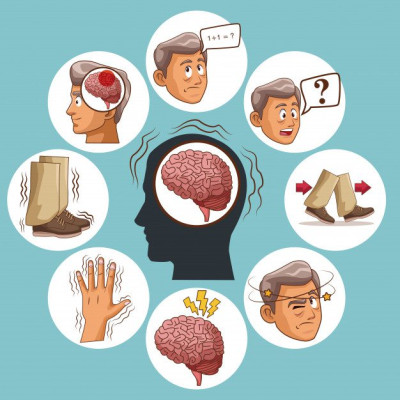
Parkinson’s Disease
What is Parkinson’s Disease?
Parkinson’s disease (PD) is a disease affecting a specific part of the brain, which is responsible for the production of a neurochemical substance called dopamine.
It’s a disease where the brain degenerates slowly over the years.
What is the role of dopamine in the development of Parkinson’s disease?
Dopamine is crucial in the transmission of signals between nerve cells and helps to smooth our movement in a balanced way.
In Parkinson’s disease, the nerve cells which produces dopamine dies and as a consequence dopamine is reduced causing slowness in movement.
At what age Parkinson’s disease develops?
It affects people usually from the age of 60 and above, but it can also affect ages between 30 and 40.
Are there specific causes of Parkinson’s disease?
Usually the cause is not clearly identified, but it is most likely multifactorial with environmental, viral and genetic factors playing a significant role.
What are the symptoms?
The four major symptoms of Parkinson’s disease are:
1 – Tremor (shakiness) of the jaw, arm, and legs.
2- Stiffness of the arms and leg.
3- Slowness of the movements.
4- Loss of balance.
Is it possible to discover the disease before the development of the tremors ‘’shakiness’’?
There are symptoms which occur several years before the disease manifests itself, such as:
1- Loss of smell
2- Constipation
3- Dream enactments: where the patient starts to scream and kick during sleep
4- Mood disturbance: depression
5- Unexplained sensation felt on the legs which causes restlessness and an urge to move, and walking improves the symptoms
Is Parkinson’s disease only about ‘’shakiness and stiffness’’?
There are other nonmotor symptoms which affects the patient significantly, and they are:
1- Poor sleep pattern
2- Depression, anxiety and loss of interest
3- Dizziness while standing up from a lying position
4- Constipation
5- Sexual depression
6- Excessive sweating
7- Urinary difficulties
8- Visual hallucinations; seeing things which are not truly present
9- Nausea & vomiting
10- Unexplained pain
11- Cognitive decline; difficulties in memory
12- Increased saliva and drooling
13- Weight loss
14- Appearance of dandruff on the forehead and scalp
15- Difficulties in swallowing
Are there any tests to diagnose Parkinson’s disease?
There are no definite tests to diagnose the disease, but a specialized doctor can request other investigations to exclude the disease.
Can Parkinson’s disease be treated?
Unfortunately, there are no definite treatments. The aim of the available treatment is to restore the dopamine levels and improve the quality of life.
What are the available treatments?
The most common drug used is levodopa/carbidopa.
Other medications used are:
1- Dopamine agonist
2- Amantadine
3- Anticholinergics
4- MAO-B inhibitors
5- COMT inhibitors
6- Apomorphine pen and pump
7- Duodopa pump
8- Deep brain stimulation
What does PD patients need in addition for better outcome?
Underlying depression, constipation, sleep and urinary difficulties and other symptoms mentioned above should be treated promptly to improve the quality of life.
Any advice with regards to meals and medications?
Levodopa/carbidopa (Sinemet) should not be taken with high protein meals. The behind this is that the protein will prevent the absorption of levodopa and leads to worsening of symptoms, especially in advanced stage.
So it’s better to take the medication one hour before or two hours after a meal.
For the best effect, the medication should be taken on an empty stomach, and if nausea develops, then it could be taken with a light snack.
Can Parkinson patients fast during the month of Ramadan?
This depends on how many times do they have to take the medication throughout the day. This should be a joint decision between the neurologist and the patient.
Any advices for better outcomes and in delaying the progression of the disease?
Medications should be taken according to specified timings and patient should avoid missing the doses. Patients should also be recommended to interact socially with friends and family and avoid isolation. They should also be encouraged to have physical exercise and mental exercise (like solving puzzles such as sudoku).
Special thanks to Dr.Mishal Abu Al-Melh, Movement and Neuro-Opthalmology Consultant